I have to wait until 11 am for the rain to stop in order to leave Farmoriah and Guinea. I have only 10 km left to the Sierra Leonean border in Pamelap.
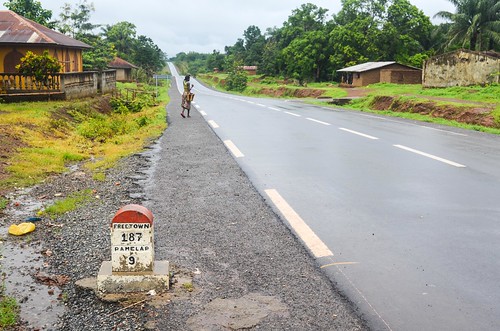
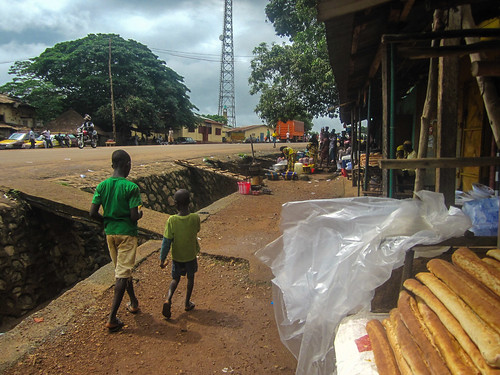
While the exit of Guinea is quick, the entry into Sierra Leone is lengthy. I have to stop three times at the military checkpoint, then the police checkpoint, and finally the immigration checkpoint, the most important one (that stamps the passport) but the only one without a road block and where you have to look for the immigration officer on your own.
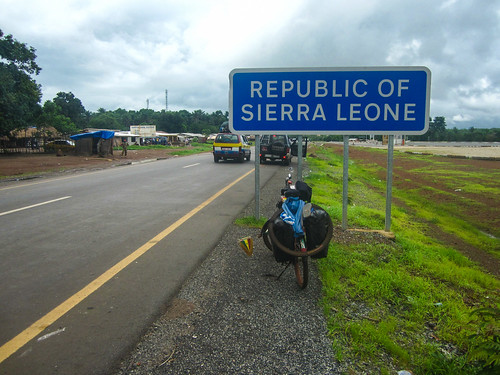
I am welcomed at the first checkpoint by a soldier uttering calmly: “You have committed an offense“. All of the staff at the military checkpoint have a big shaved head, a generous belly, and a deep scary voice. The best way to get problems in a country even before entering it is to take a picture of the border area like the one above. Of course I had asked the permission, but not to the right officer, according to the troublemaker soldier.
By now, I am used to nonsense conversations with officials. So we joke for 5 minutes about the imaginary trouble I just got into, and then we are best friends. It appears that they are all friendly, and as usual, can’t read a passport. Especially, it seems the paragraph “colour of eyes” has made on purpose to disturb them.
I get my passport stamp some hundreds meters further, at the immigration building, where the officer has an argument with another lady. When they speak Krio, it sounds to me like a parody of American rap. The good news is that my visa, valid for 2 months, meant actually “must be used within 2 months and valid for 30 days from the date of entry”. It is never explicit what the visa dates mean, and there are misunderstandings even between embassies and border officials. This time, I get 30 days when I expected 20, but I will probably cross the whole country in less than that.
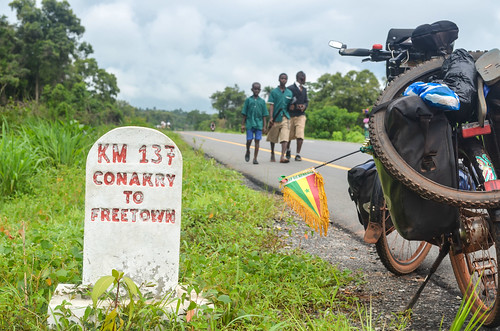
The road until Freetown is brand new, but the rain started again. I wait in a bar for 30 minutes, cycle one kilometer, and shelter again in a restaurant. The prices for food seem to be slightly higher than in Guinea. The plate of rice with kassava leaves and fish is 4000 leones. I had changed 80 000 GNF (Guinean francs) into 50 000 SLL (Sierra Leonean leones), which is roughly 10 €.
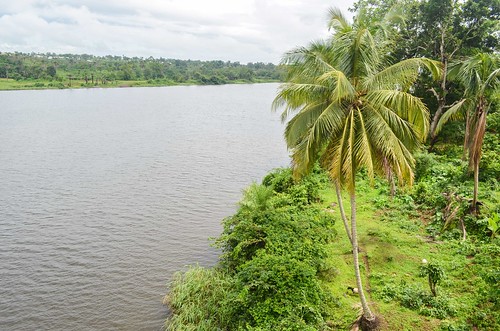
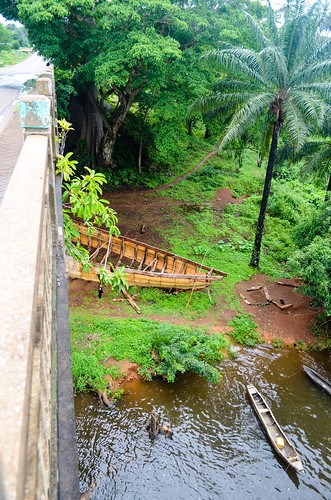
The first town in Sierra Leone is Kambia. My nickname of “Foté” changed for “Apoto”. I thought at first the kids were calling for “a photo”, but “Apoto” is simply the way to call a White man in Temne. The Temne people (30% of Sierra Leone) live predominantly in the north of Sierra Leone, while the south is home to the Mende people (30%). The most widespread language is Krio, brought in by the Krio people.

The history of Sierra Leone is special and interesting. The country started to see Western settlers from the XVth century for slave trade, like the other areas of West Africa. But in the XVIIIth century, some British bought a piece of land with the goal to “re-settle” freed American slaves that were suffering from poverty in London. The whole country became a British colony and the non indigenous Blacks, called the Krios, were occupying most of the important positions in the administration, despite their minority (2% of the population). After the independence in 1961, the country was split between the political party of the Temne, the one of the Mende, and the influential Krios in between. The first coup happened in 1967. What follows is an impressive succession of coups and battles to control the diamond mining areas. The peace returned only in 2000.

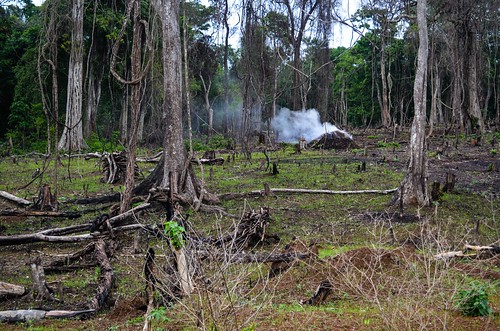
The ride is beautiful. I notice on my left that the sky is turning into a beautiful carpet of black and purple clouds.

It seems the rain is coming but it doesn’t stop me from taking pictures. The layer of clouds, really low, makes an interesting contract with the palm trees.
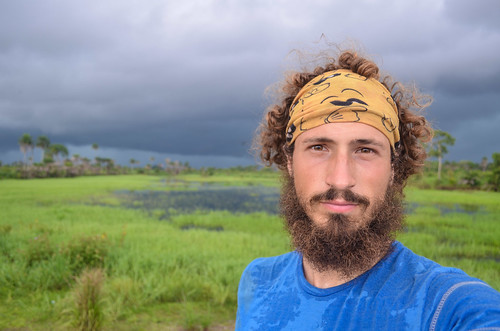
It is only 3 pm and the atmosphere is special. It is a bit like the night in the middle of the day. The silence took over the plain, the birds and the traffic became quiet.
And all of a sudden, the palm trees start to shake vigorously under a very strong wind.
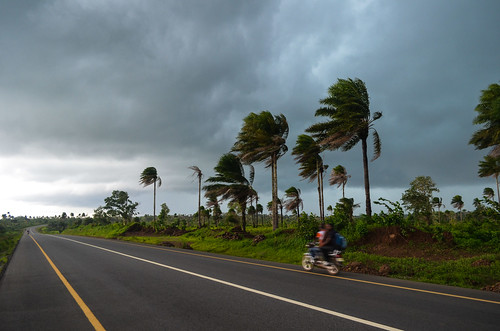
The first rain drops start falling. It all happened within 5 minutes from the time I realized the black clouds were no more friendly. And it is unrolling very violently. I have spotted houses made of concrete about one kilometer further and I really need to speed up now. The wind, nonexistent 2 minutes ago, is blowing against me, and the gusts make it hard to pedal along a straight line.
I didn’t expect the sky to break down with this haste and now fear to get soaked before reaching a shelter. I race in a panic until that building, the single that is not a hut made of leaves, just when the rain starts pouring. The place is a workshop and empowering center where disabled people make windows, doors and things of steel. They have already covered the generator and tell me to come until the end of the room with my bicycle. At the same moment, two youngsters arrive on a motorbike and hurry inside. The rain is now pouring well for a minute and a pool has formed in front of a workshop. Another cyclist joins us, one minute too late, completely soaked.
The rattling of the rain wildly hitting on the metallic sheets of the roof makes it impossible to have a discussion. We can only remain silent and watch the lightnings surrounding us (and very close). The rain falls almost horizontally and it’s wet everywhere. It is really scary (especially if I imagine being by myself in the palm trees); I don’t remember having witnessed such a violent rain. The traffic on the main road disappears. I see only a couple of 4×4 driving slowly.
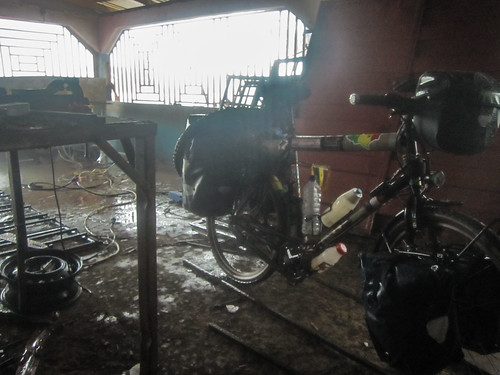
Less than one hour later, the noise decreases and allows us to chat. The sky slowly lightens, the roosters crow as if to let people know that the day can resume.
I return on my bicycle, in a very dark and humid air, on a road that looks like a bridge crossing washed out lands. I feel I just survived to a small apocalypse, but maybe it is only a foretaste of what is awaiting me. It is June 25th, and the rainy season is from May to October, with the wettest months being July and August. I will reach Freetown in 150 km, and Freetown is one of the two wettest capital in Africa. The other one is Monrovia (Liberia), about which we can read: “in the month of July alone, Monrovia sees almost double the rainfall that London does in a year.” I think I should stick to paved roads from now on, I don’t want to be cycling on a mud track under this rain.
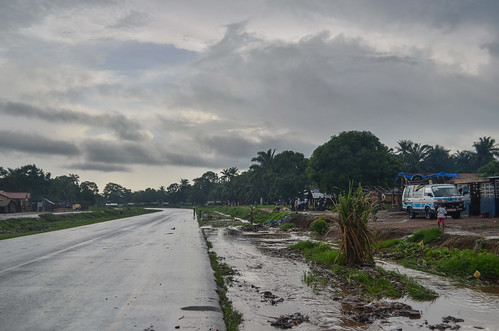
There is a bit more riding until Port Loko. The light is dim. Port Loko will make a nice stop after 75 kilometers, which is not too bad for a distance in a day that saw rain until 11 am, from 1 pm to 2 pm, and from 3 pm to 4 pm.

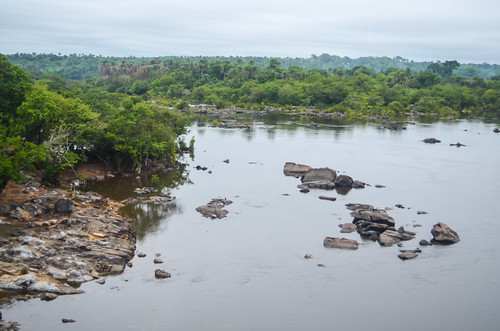
As it is my first day in Sierra Leone and I don’t know what to expect in terms of accommodation, I stop just before Port Loko at one of the many houses in construction by the side of the road. I have seen so many of them today, just bricks for the walls and a metallic roofing. The owner of the house in construction is living in his own house just behind. He is building this new one for his daughter who just married a young man, Lamin.
We eat rice with a bonga sauce, made from the fruit of the palm tree, before the family let me sleep in the unfinished house. As it could be predicted, considering the incredible hospitality that is offered to me since I crossed the Gibraltar strait, they wanted to free a room in their home just for me.

I had been told in Guinea that the family names Camara, Touré, Ba, Diallo, Cissé, are names originally from Guinea. And the Coulibalys are from Mali. It would have been too easy … as my current hosts are called Sissey and Turay, pronounced the same way as Cissé and Touré, and don’t feel Guinean at all. Let’s just say they are all names of the former Mali empire.
The night is quite chill, and I take out my sleeping bag for the first time since the Sahara. I have been fine with a silk linen since Mauritania. The rain brings the temperatures lower and this is very much appreciated.
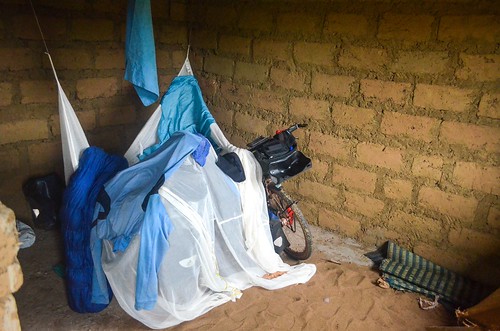
It rained a lot during the night. The wind blew sand in my face and many of my stuff flew around. It is still raining in the morning, and for what I know, from 5 am to noon. I am not taking the road in the rain and just wait instead. This leaves me time perform a good cleaning of my bike, cook pasta, and hang out with the young boys and girls, who are not going to school either, because of the rain.
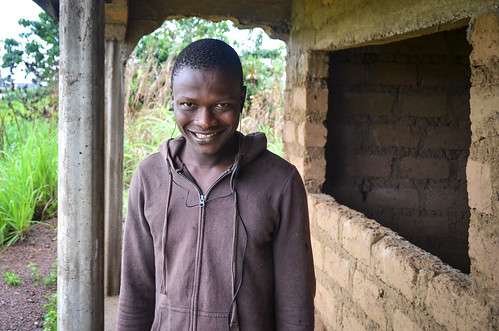
I am beginning my cycling day at 12 with the strategy to make the most of the non-rainy hours.
I make a quick tour in Port Loko to see what it looks like, and also to see where I would have slept if I had gone there for the night. The only B&B advertised has rooms starting from 40 USD, which makes me feel good about having stopped before the town. I fill up my bottles from rainwater containers since the public taps are closed until 4 pm to prevent waste. An old man advises me to drink one of the small alcohol packages selling for 500 leones (0,10 €), “because it’s cold“. The rainy season is cold indeed, but the temperatures are now just good for me.
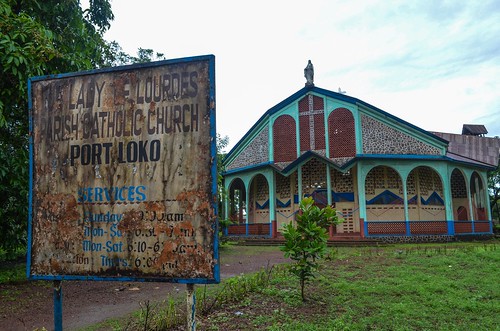
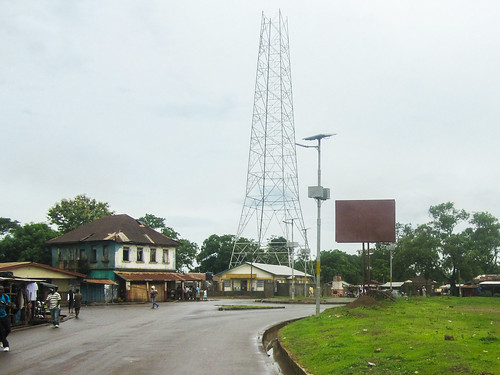


The main road from Port Loko to Freetown is doing a L shape in order to avoid a bay and reach the peninsula. There is a more direct way involving a ferry crossing, via Lungi and the airport, which I pick. It should have much less traffic, and the construction is almost finished: only the first 10 first kilometers are not paved yet.
I am not excited about going onto dirt roads – Port Loko streets were enough – especially after so much rain and with my just-cleaned bike. It will be only 10 kilometers and the road is in good shape, so I am venturing in confidently. Very rapidly, the red mud gets stuck in my fenders and brakes and stops my wheel from turning. Johannes had passed here 2 weeks ago and said it was a good road, even a bit dusty. The rain changed everything.
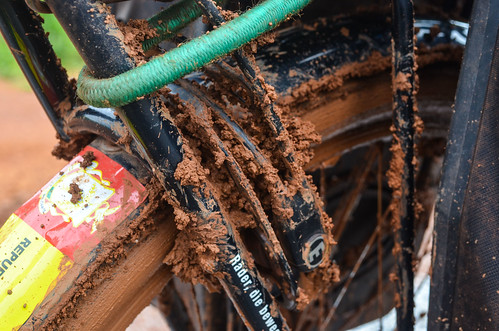
I have this problem with my fenders when I cycle on tracks of red mud during or after the rain: the small clearance with the tires compresses the sticky mud that eventually blocks the rear wheel. I have to push it and stop every 500 meters to clean the mud with a wood stick.
My bike is now repainted in red and I am counting each meter of pushing. I finally see machines afar and the road color changing from red to black: the Chinese are in the process of building it. After a last cleaning, my rear wheel turns smoothly again and I make a new start on the brand new asphalt.
Not for long. It’s already too late when I realize that the road is not ready yet. It’s not a brand-new-asphalt, but a soon-to-be-brand-new-asphalt. Tiny pieces of asphalt, not soldered to the road, are flying under my wheels and they stick onto my tires, rims, panniers and brakes. Fortunately my chain guard protects the chain and sprocket from being contaminated by this dangerous chewing gum. Still, the transmission makes noises, the fresh tar in my fenders and on my frame are now attracting all the pebbles and gravel, and I don’t like the fact that I have small sticky black dots everywhere. I stop one more time in a big rainwater puddle to remove the biggest chunks, but the sticky tar remains all over my bike and panniers.
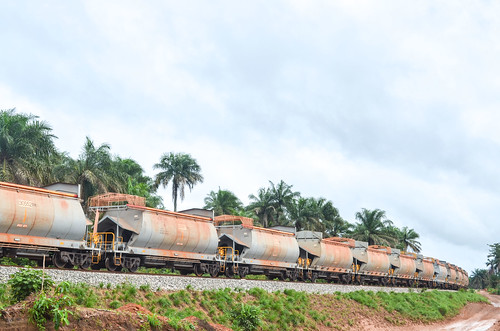
After a whole morning of rain, and a slow afternoon in the mud and in the tar, it is already late afternoon and I didn’t move much. I quit thinking of Freetown as my destination for the day and will settle with Lungi, the small town from where the ferry departs.
The Chinese Railway Seven Group Company Limited is building the road and a railway, most probably to support the mining in the interior of the country. The story of the movie Blood Diamond takes place in Sierra Leone, and there should be enough diamond and gold in the country to take the 6 millions of Sierra Leoneans out of the top 10 of the various rankings of the least developed countries in the world. There is also a huge touristic potential to wake up.
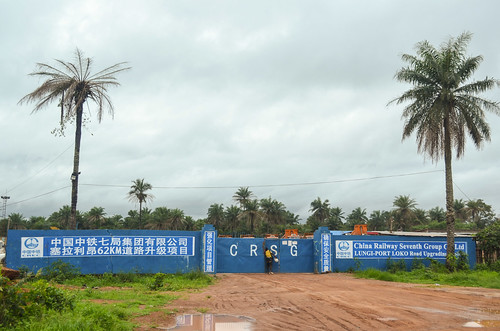
I arrive in Lungi just before night, and just when the rain starts to pour again. Lungi is the airport town for the capital, smartly separated from Freetown by a channel and a ferry. There must be plenty of accommodation choices, I thought. The first guesthouse I visit has rooms starting from 45 €. The cheapest in town has rooms “as low as 30 €”. What happened to the cheap hostels for around 5 € ? The thing is that Sierra Leoneans don’t travel to places where they don’t have a place to stay. Even if the food can be as cheap as anywhere else in Africa, like meals for under 1 €, there is no cheap accommodation. Only businessmen and tourists can afford it.
And since the currency is very low, one has to pay for a 250 000 leones with 25 bank notes of 10 000 leones, at best. I don’t even have this money, since all I have is the money I changed from my Guinean francs. I didn’t come across an ATM in Sierra Leone yet. The ATMs in Guinea were issuing a maximum of 30 notes at once (the largest note being 10000 GNF, it limits the maximum withdrawal to 31 € per transaction).

I thought that in 2013, there would be ATMs about everywhere and I wouldn’t have to carry big money in cash for the whole African trip. It is not wrong, there are ATMs in each county, at least in the capital. Ecobank and other African banks are well connected. But I didn’t imagine that the limitation factor would be the technical side of the ATMs and the fact that local currencies are worth almost nothing. I wish I had taken 10 notes of 100 € while in Spain, it takes no space and can be changed anywhere. The money changers are in every village market. The loss in the conversion is not worse than the banking fees to withdraw cash from a credit card (and by the way, Mastercard is useless in West Africa, only Visa works).
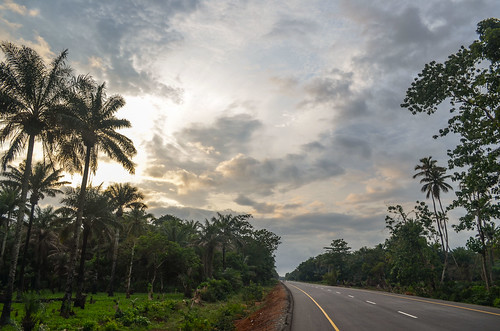
So I have no solution yet and want to avoid sleeping outside if possible. Since it is Africa, there is always a solution. The night guard of the “reasonably priced” guesthouse of Lungi, Issa, suggests that since he must work until 8 am, I can stay in his room at his family house until the morning. That’s a wonderful idea, I can stay dry and give him what I would pay in a normal cheap African guesthouse.
He lives in a remote part of Lungi that can be reached only with a motorbike or an adventurous 4×4. It is a strange feelings to land in the daily life of the family at night and occupy Issa’s room. The kids are eager to talk with me, and we witness a verbal fight at night under the rain. Like in Matrix Revolutions, but without the style. I am so thankful to Issa when I fall asleep while it is raining cats and dogs (and Olympic swimming pools).
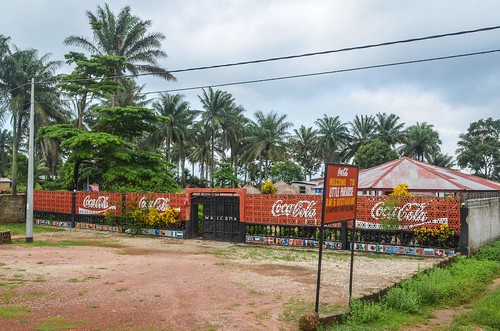







Leave a Reply